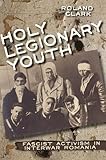Holy Legionary Youth : Fascist Activism in Interwar Romania / Roland Clark.
Material type: TextPublication details: Ithaca : Cornell University Press, (c)2015.Description: 1 online resourceContent type:
TextPublication details: Ithaca : Cornell University Press, (c)2015.Description: 1 online resourceContent type: - text
- computer
- online resource
- 9780801456343
- DR264 .H659 2015
- COPYRIGHT NOT covered - Click this link to request copyright permission: https://lib.ciu.edu/copyright-request-form
| Item type | Current library | Collection | Call number | URL | Status | Date due | Barcode | |
|---|---|---|---|---|---|---|---|---|
 Online Book (LOGIN USING YOUR MY CIU LOGIN AND PASSWORD)
Online Book (LOGIN USING YOUR MY CIU LOGIN AND PASSWORD)
|
G. Allen Fleece Library ONLINE | Non-fiction | DR264 (Browse shelf(Opens below)) | Link to resource | Available | ocn918150830 |
Includes bibliographies and index.
The roots of ultra-nationalism -- Youthful justice -- Mobilizing support -- Elections, violence, and discipline -- The power of print -- Iron-clad breasts and lily-white souls -- Salvation and sacrifice -- Rise and fall.
Founded in 1927, Romania's Legion of the Archangel Michael was one of Europe's largest and longest-lived fascist social movements. This book approaches Romanian fascism by asking what membership in the Legion meant to young Romanian men and women. Viewing fascism from below, as a social category that had practical consequences for those who embraced it, the book shows how the personal significance of fascism emerged out of Legionaries' interactions with each other, the state, other political parties, families and friends, and fascist groups abroad.
COPYRIGHT NOT covered - Click this link to request copyright permission:
There are no comments on this title.
